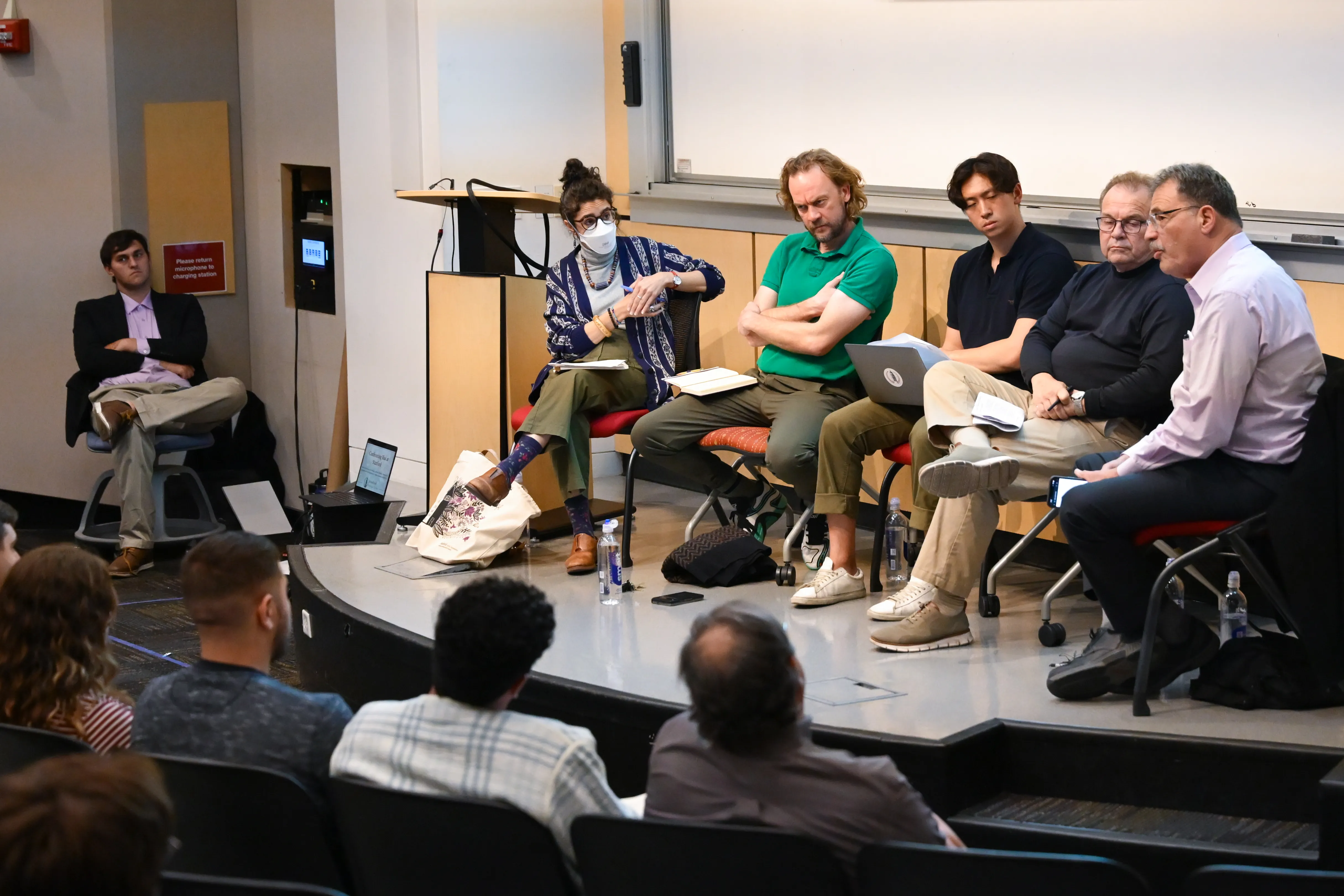Committee members who evaluated Islamophobic and antisemitic bias on campus called for sustained commitment to mutual respect and critical inquiry during a student-facing panel discussion at Bishop Auditorium on Monday.
The panel featured members of the Muslim, Arab and Palestinian (MAP) Communities Committee, including co-chair Alexander Key, a comparative literature professor, and committee member Natalie Jabbar ’09 M.A. ’10, the Public Humanities Initiative associate director. Members of the Subcommittee on Antisemitism and Anti-Israeli Bias (ASAIB) were also on the panel, which included co-chairs Larry Diamond ’74 M.A. ’78 Ph.D. ’80 and Jeffrey Koseff M.S. ’78 Ph.D. ’83. Diamond is a senior fellow at the Hoover Institution and Koseff is a senior fellow at the Woods Institute for the Environment.
The panelists addressed student questions on free speech and open dialogue at the event hosted by the Stanford Political Union and moderated by YuQing Jiang ’25, a Stanford Daily opinions editor.
Following Hamas’ Oct. 7, 2023 attack on Israel and a reported rise of hate crimes against Jewish, Muslim and Arab students, former University President Richard Saller commissioned the two committees in November 2023 to evaluate antisemitic and anti-Palestinian discrimination in the Stanford community.
Last spring, each committee — composed of faculty, staff, students and alumni — released a 148-page report detailing dozens of instances of restricted speech, harassment and intimidation on campus.
Both committees conducted listening sessions, drafted reports and crafted recommendations for confronting bias and fostering community at Stanford. But “everyone was afraid to have their name attached to their sentiments,” Jabbar said, which made their work “very difficult.”
Diamond said he gained insight into the sentiments shared by members of Stanford’s Jewish and Israeli community during the ASAIB subcommittee’s listening sessions.
“The hardest [part] was having Jewish students tell me what they have been experiencing,” he said.
He recounted “one surprising and very tearful incident” in which a student told him: “‘I haven’t had any trouble. You know, no one’s said anything antisemitic about me’ — and then the tears start forming — ‘but most of my friends don’t know I’m Jewish.’”
Koseff said that Stanford’s Jewish students felt as though they were being held responsible for the actions of the Israeli state, leading to “feelings of alienation.”
Key described the University’s tendency to “assume the position of a neutral container” in light of campus protests in support of Israel and Palestine, as “detrimental to both the community of the University and its scholarly work.” Key added that in order to be welcome in the neutral container, students are forced to “leave their whole selves at the door.”
Diamond emphasized the importance of creating a campus culture of “mutual respect, mutual tolerance, mutual engagement and mutual listening.” The University must continue its work to ensure student safety, Diamond said, citing instances of physical harassment on Stanford’s campus and across the country.
In September, the University published updated policies on the expression of free speech and processes to report discrimination and harassment. The guidelines replaced Protected Identity Harm (PIH) reporting, instead implementing a new means for reporting physical harassment under Title VI of the 1964 Civil Rights Act.
The panelists criticized a New York Times article that stated the two “dueling reports” illustrate the “rift between Jewish and Muslim groups on campus.”
“It’s not Jews versus Muslims. We say it over and over again, ‘We’re not fighting Jeff and Larry,’” Key said. “The framing just keeps coming back to this binary balance. It instrumentalizes and objectifies. It doesn’t listen [to members of these communities].”
The panelists said both committees plan to present their respective findings with the Faculty Senate. They also plan to discuss the University’s role in facilitating future discussions between Stanford’s Jewish and Muslim, Arab and Palestinian communities on campus.
“Our dream for the report is that we will be able to build a university [culture] where students don’t have to go out and camp on White Plaza to talk about issues [the University] won’t,” Key said.
Diamond underscored the importance of using the University’s academic platform to advance rational debate on all relevant issues, beyond the Israel-Gaza conflict.
“There shouldn’t be an exception to what we can debate and talk about in terms of domestic policy, international affairs, philosophy and basic values,” Diamond said. “Students will find a variety of means to ensure that their voices are heard, that issues are raised, and hopefully that we listen to one another and push the boundaries of our understanding and our arguments with discourse that is both vibrant and mutually respectful.”
